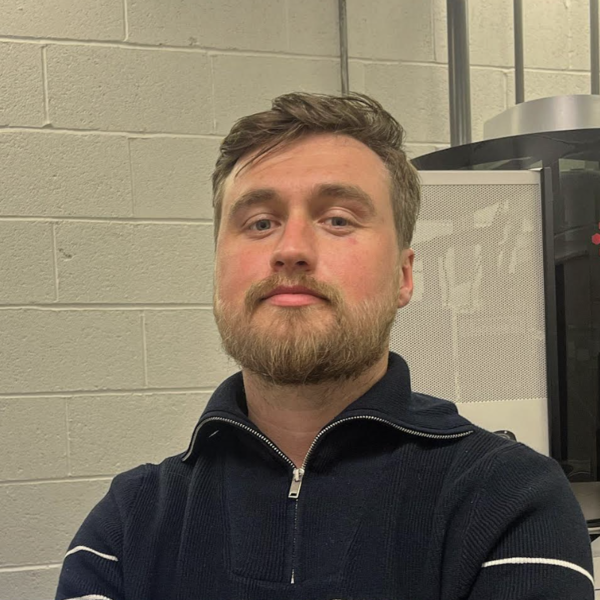Dr Nicholas Farr
School of Chemical, Materials and Biological Engineering
EPSRC Doctoral Research Fellow


Full contact details
School of Chemical, Materials and Biological Engineering
North Campus
Broad Lane
91ų▒▓ź
S3 7HQ
- Profile
-
After completing undergraduate studies in both Human Biology at Loughborough University and Law at BPP Law School, Nicholas joined the Department of Materials Science and Engineering at the University of 91ų▒▓ź as a PhD researcher under the guidance of Professor Cornelia Rodenburg, focusing on Tissue Engineering and Regenerative Medicine.
His early research concentrated on pioneering materials characterisation techniques tailored for the surface analysis of biomaterials. Nicholas demonstrated the ability of advanced imaging methodologies to elucidate the intricate dynamics of cellular interactions with polymeric biomaterials and medical devices. Upon the submission of his PhD thesis titled ŌĆ£Evaluation of a novel, Scanning Electron Microscope-based surface chemical mapping technique for characterising polymeric biomaterials,ŌĆØ he received the esteemed EPSRC Prize Research Fellowship. This enabled him to undertake independent research within the fields of biomaterials and instrumentation development.
Currently, Nicholas's research interests revolve around the innovation of analytical tools aimed at bolstering pre-clinical testing methodologies for future medical devices. Renowned for expertise in biomaterials characterisation and testing, he has authored numerous impactful studies, with recent focus directed towards comprehensively understanding clinical challenges associated with surgical mesh applications. Nicholas adeptly leverages the principles of mechanochemistry to refine the evaluation of such medical devices, thereby informing the advancement of the next generation of biomaterials.
In addition to his Fellowship, Nicholas has held prestigious researcher positions supporting materials characterisation projects funded by notable entities such as the EPSRC, UK Defence Science and Technology Laboratory (DSTL), UK Medical Research Council, and industrial collaborators (inc Johnson Matthey). His scholarly pursuits have also taken him across borders, serving as a visiting researcher at esteemed institutions including the University of British Columbia (Canada) and Monash University (Australia).
- Research interests
-
Learning from the past: Investigating medical devices (surgical mesh):
Surgical mesh is one of the biomaterials for which Nicholas has characterised and published studies. In 2021, he developed and published a study presenting a novel characterisation approach to reveal the mechanoŌĆōchemical effects of oxidation and dynamic distension on polypropylene surgical mesh. This paper is significant in the field as it not only shows evidence that polypropylene surgical mesh is subject to oxidative degradation but also provides insights into how the degradation of polypropylene can affect the functional properties of the mesh in vivo. Following this study, he has published various supplementary papers outlining the process of oxidative degradation of polypropylene surgical mesh. These publications include the first papers to characterise, quantify, and identify particles released from polypropylene mesh after exposure to an oxidative stress environment, the first study to characterise titanium-coated polypropylene surgical mesh explanted from humans, the first study to study macrophages (cells involved in the immune response) cultured directly onto surgical mesh, the first study to modify the formation of surface cracking/crazing on surgical mesh using plasma modification, and the first paper to show time-related degradation of polypropylene surgical mesh in vivo.
He continues to conduct research within this field, working with internationally renowned clinicians and academics from a host of institutions including NHS teaching Hospital trusts, Institute for Pathology at D├╝ren Hospital, University of Witten Herdecke, Leibniz Institute for Plasma Science and Technology, University of Queensland, University of Newcastle, Freeman Hospital, and University Hospitals KU Leuven.
Informing the future: Uncovering the relationship between cells and medical devices:
Biomaterials exhibit significant variability in their cellular response, yet existing material characterisation methods have failed to elucidate a clear mechanism for this response. As a consequence, Nicholas and his colleagues have developed a systematic characterisation analysis strategy. They employ machine learning approaches to adapt and extend this strategy, aiming to identify specific spectral signatures indicative of biomaterial/cell chemistry or topography, respectively.
To date, Nicholas's research has been successful in linking actual cell growth behavior with nanoscale structural, chemical, and bulk mechanical information captured from biomaterials of dissimilar compositions. Publications resulting from international and UK-based collaborations (including NHS teaching Hospital trusts, Leibniz Institute for Plasma Science and Technology, University of Oxford, University of Warwick, Cracow University of Technology, University of British Columbia, Monash University, University of Antwerp, New York Structural Biology Centre) continue to receive much interest.
- Publications
-
Journal articles
- . Journal of the Mechanical Behavior of Biomedical Materials, 106722-106722.


- . Biomaterials Advances, 213800-213800.


- . Advanced Science.


- . Polymer Testing, 128.


- . POLYMER CHEMISTRY, 2023(38), 4375-4496.


- . Materials Today Advances, 19.


- . Polymers, 15(15).


- . Bioengineering, 10(5).


- . Nano Select.


- . Journal of Biomedical Materials Research Part B: Applied Biomaterials.


- . Materials, 15(10).


- . Micron, 156.


- . RSC Advances, 11(55), 34710-34723.


- . Materials, 14(11).


- . Polymer Chemistry, 12(2), 177-182.


- . Advanced Science, 8(4).


- . Macromolecular Rapid Communications, 41(3).


- . Journal of Applied Polymer Science, 136(47).


- . Nature Reviews Urology.


- . Small Structures.


Conference proceedings papers
- . Journal of the Mechanical Behavior of Biomedical Materials, 106722-106722.
- Media
Nicholas is actively involved in disseminating his research to the public. He has authored numerous public-facing articles and has contributed to platforms such as Sky News Radio. Nicholas regularly engages with the general public and patient groups interested in his research, resulting in Q&A articles that provide valuable insights. Additionally, Nicholas has contributed to documentaries, sharing his passion for science and engineering. He collaborated on the BBC 4 Documentary series "The Secrets of Size: Going Small" and a series called ŌĆ£Engineering RebornŌĆØ premiering on Channel 4 - also available on BBC Earth (worldwide) and SDS (Australia).
